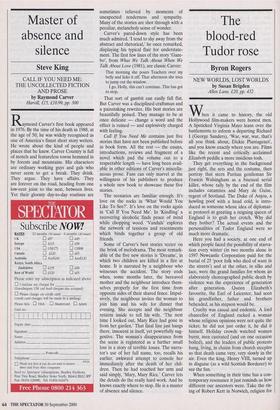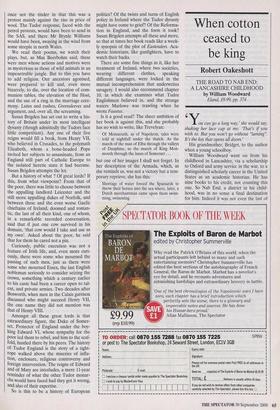The blood-red Tudor rose
Byron Rogers
NEW WORLDS, LOST WORLDS by Susan Brigden Allen Lane, f20, pp. 432 When it came to history, the old Hollywood film-makers were honest men. A lipsticked Virginia Mayo leans over the battlements to inform a departing Richard I (George Sanders), War, war, war, that's all you think about, Dickie Plantagenet', and you know exactly where you are. Films like the recent and critically acclaimed Elizabeth peddle a more insidious tosh.
They get everything in the background just right, the sets and the costume, then portray that stern Puritan gentleman Sir Francis Walsingham as a bisexual serial killer, whose tally by the end of the film includes catamites and Mary de Guise, regent of Scotland. The Duke of Anjou, a howling poof with a head cold, is intro- duced as someone whose idea of diplomat- ic protocol at greeting a reigning queen of England is to grab her crotch. Why did they bother? The actual events and the personalities of Tudor England were so much more dramatic.
Here you had a society, at one end of which people faced the possibility of starva- tion every winter (in two months alone in 1597 Newcastle Corporation paid for the burial of 25 'poor folk who died of want in the streets') and at the other, in silks and lace, were the grand families for whom an elaborately choreographed public death by violence was the experience of generation after generation. Queen Elizabeth's favourite, the Earl of Leicester, had seen his grandfather, father and brothers beheaded, as his stepson would be.
Cruelty was casual and endemic. A lord chancellor of England racked a woman whose religious opinions were not quite the ticket; he did not just order it, he did it himself. Holiday crowds watched women burnt, men castrated (and on one occasion boiled), and the leaders of public protests hung, living, in chains from church steeples so that death came very, very slowly in the air. Even the king, Henry VIII, turned up in disguise (as a wild Scottish Borderer) to see the fun.
When something in their time has a con- temporary resonance it just reminds us how different our ancestors were. Take the ris- ing of Robert Kett in Norwich, religion for once not the tinder in that this was a protest mainly against the rise in price of wool. The Tudor response, faced with the petrol protests, would have been to send in the SAS, and there Mr Brynle Williams would have been, swaying in the wind from some steeple in north Wales.
We read their poems, we watch their plays, but, as Max Beerbohm said, these were men whose actions and motives were as mysterious as those of wild animals in an impenetrable jungle. But to this you have to add religion. Our ancestors agonised, were prepared to kill and, even more bizarrely, to die, over the location of com- munion tables, the elevation of the Host, and the use of a ring in the marriage cere- mony. Lutes and rushes, Greensleeves and argument, and, over all, the screaming.
Susan Brigden has set out to write a his- tory of Britain under its most intelligent dynasty (though admittedly the Tudors face little competition). Any one of their five reigns would fill a book, from Henry VII, who believed in Crusades, to the polymath Elizabeth, whom a bone-headed Pope invited her subjects to assassinate, from an England still part of Catholic Europe to the isolated heretic state it had become. Susan Brigden attempts the lot.
But a history of what ? Of great lords? If this, from what viewpoint? From that of the poor, there was little to choose between the appalling landlord Leicester and the still more appalling dukes of Norfolk, and between these and the even worse Gaelic chieftains of Ireland, doomed and roman- tic, the last of all their kind, one of whom, in a remarkable recorded conversation, said that if just one cow survived in his domain, 'that cow would I take and use as my own'.. Asked about the poor, he said that for them he cared not a pin.
Curiously, public execution was not a feature of Irish life, and, even more curi- ously, there were some who mourned the passing of such men, just as there were some who mourned Essex, the last English nobleman seriously to consider seizing the crown, something which a century earlier to his caste had been a career open to tal- ent, and private armies. Two decades after Bosworth, when men in the Calais garrison discussed who might succeed Henry VII, the one name they did not mention was that of Henry VIII.
Amongst all these great lords is that extraordinary figure, the Duke of Somer- set, Protector of England under the boy- king Edward VI, whose sympathy for the poor led them to rebel, and him to the scaf- fold, hustled there by his peers. The history of Tudor England is the story of a tight- rope walked above the miseries of infla- tion, enclosure, religious controversy and foreign intervention. The reigns of Edward and of Mary are interludes, a mere 11-year reminder of what the other Tudor monar- chs would have faced had they got it wrong, and also of their expertise.
So is this to be a history of European politics? Of the twists and turns of English policy in Ireland where the Tudor dynasty might have come to grief? Of the Reforma- tion in England, and the form it took? Susan Brigden attempts all these and more, so that at times her book reads like a week- ly synopsis of the plot of Eastenders. Aca- demic historians, like gunfighters, have to watch their backs.
There are some fine things in it, like her treatment of Ireland, where two societies, wearing different clothes, speaking different languages, were locked in the mutual incomprehension that underwrites savagery. I would also recommend chapter 10, in which she examines what Tudor Englishmen believed in, and the strange waters Marlowe was trawling when he wrote Faustus.
Is it a good read? The sheer ambition of her book is against this, and she probably has no wish to write, like Trevelyan:
Of Monmouth, as of Napoleon, tales were told at nightfall under the thatch. As the march of the man of Elba through the valleys of Dauphine, so the march of King Mon- mouth through the lanes of Somerset ...
but one of her images I shall not forget. In her description of the Armada, which, as she reminds us, was not a victory but a tem- porary reprieve, she has this:
Shortage of water forced the Spaniards to throw their horses into the sea where, later, a Dutch merchantman came upon them swim- ming, swimming.



























































































 Previous page
Previous page